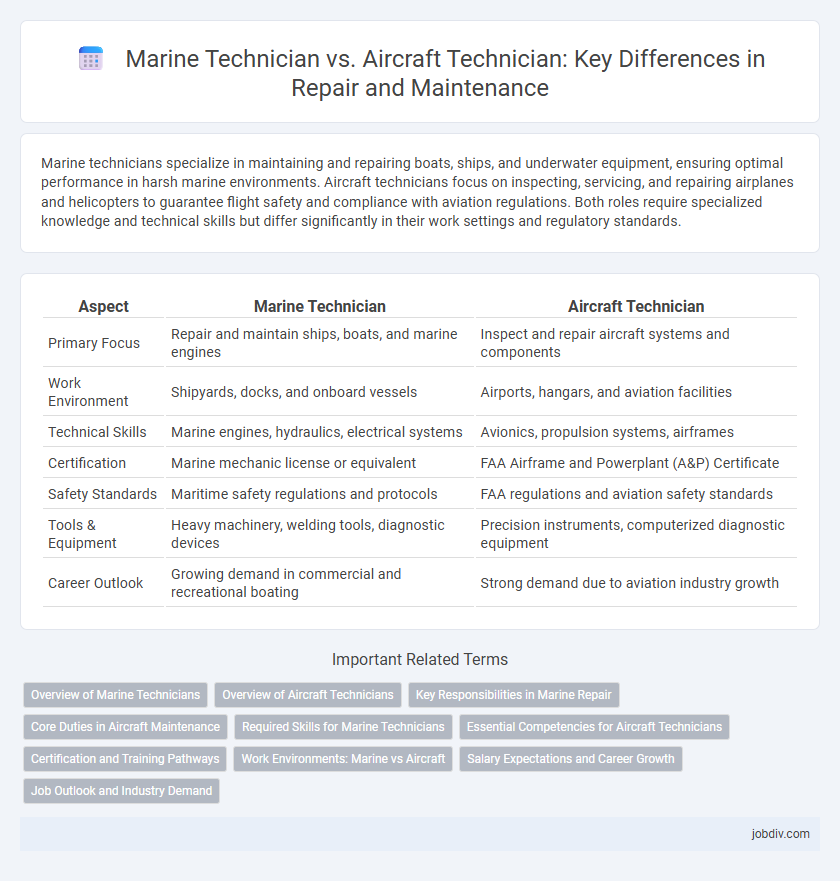Marine technicians specialize in maintaining and repairing boats, ships, and underwater equipment, ensuring optimal performance in harsh marine environments. Aircraft technicians focus on inspecting, servicing, and repairing airplanes and helicopters to guarantee flight safety and compliance with aviation regulations. Both roles require specialized knowledge and technical skills but differ significantly in their work settings and regulatory standards.
Table of Comparison
| Aspect | Marine Technician | Aircraft Technician |
|---|---|---|
| Primary Focus | Repair and maintain ships, boats, and marine engines | Inspect and repair aircraft systems and components |
| Work Environment | Shipyards, docks, and onboard vessels | Airports, hangars, and aviation facilities |
| Technical Skills | Marine engines, hydraulics, electrical systems | Avionics, propulsion systems, airframes |
| Certification | Marine mechanic license or equivalent | FAA Airframe and Powerplant (A&P) Certificate |
| Safety Standards | Maritime safety regulations and protocols | FAA regulations and aviation safety standards |
| Tools & Equipment | Heavy machinery, welding tools, diagnostic devices | Precision instruments, computerized diagnostic equipment |
| Career Outlook | Growing demand in commercial and recreational boating | Strong demand due to aviation industry growth |
Overview of Marine Technicians
Marine technicians specialize in the maintenance, repair, and troubleshooting of marine vessels, including engines, electrical systems, and onboard electronics. They ensure the operational efficiency and safety of boats, ships, and submarines by conducting routine inspections and repairing mechanical or electrical faults. Their expertise in marine-specific systems differentiates them from aircraft technicians, who focus on aviation machinery and aeronautical maintenance.
Overview of Aircraft Technicians
Aircraft Technicians specialize in the maintenance, inspection, and repair of aircraft systems including engines, avionics, and structural components to ensure flight safety and compliance with aviation regulations. Their expertise involves troubleshooting complex mechanical and electronic issues, performing routine checks, and updating software systems on modern aircraft. Unlike Marine Technicians who focus on ships and underwater equipment, Aircraft Technicians operate in highly regulated environments requiring certification and precise adherence to safety protocols.
Key Responsibilities in Marine Repair
Marine technicians specialize in the maintenance and repair of boat engines, electrical systems, and hull integrity, ensuring optimal vessel performance and safety. They diagnose mechanical failures, perform routine servicing, and handle corrosion control specific to marine environments. Aircraft technicians focus more on avionics, airframe repair, and strict regulatory compliance, which differs significantly from the marine sector's emphasis on saltwater-resistant materials and propulsion systems.
Core Duties in Aircraft Maintenance
Marine technicians specialize in maintaining and repairing ship engines, hulls, and onboard systems, ensuring vessel safety and operational efficiency. Aircraft technicians focus on inspecting, repairing, and certifying aircraft components such as avionics, engines, airframes, and hydraulics to guarantee flight safety and compliance with aviation regulations. Core duties in aircraft maintenance prioritize adherence to Federal Aviation Administration (FAA) standards and use diagnostic tools to detect mechanical failures.
Required Skills for Marine Technicians
Marine technicians require specialized skills in corrosion control, underwater welding, and engine diagnostics to maintain and repair vessels effectively. Proficiency in hydraulic systems, navigation electronics, and environmental safety standards is essential for ensuring operational reliability at sea. Unlike aircraft technicians who focus on aeronautical systems, marine technicians prioritize mechanical and electrical repairs tailored to marine environments.
Essential Competencies for Aircraft Technicians
Aircraft technicians must possess a deep understanding of aerodynamics, avionics, and aircraft systems to ensure the safety and efficiency of flight operations. Precision in troubleshooting complex mechanical and electronic issues, along with the ability to interpret detailed technical manuals and schematics, is crucial. Mastery of FAA regulations and adherence to strict maintenance protocols distinguish aircraft technicians from marine technicians, whose expertise centers on maritime engines and vessel systems.
Certification and Training Pathways
Marine technicians typically pursue certifications through the American Boat and Yacht Council (ABYC) or the National Marine Electronics Association (NMEA), emphasizing hands-on training in engine diagnostics, electrical systems, and marine safety. Aircraft technicians require FAA Airframe and Powerplant (A&P) certification, which mandates rigorous formal education, practical experience, and passing written and practical exams to ensure compliance with aviation safety standards. Both paths demand ongoing education to stay current with evolving technologies, but aircraft technician certification involves stricter regulatory oversight compared to marine technician credentials.
Work Environments: Marine vs Aircraft
Marine technicians work primarily in harsh, saltwater environments aboard ships, docks, and offshore platforms, requiring expertise in maintaining engines and navigation systems exposed to marine conditions. Aircraft technicians operate in controlled airport hangars and airfields, focusing on maintaining airframes, avionics, and propulsion systems subject to strict aviation safety standards. Both roles demand specialized diagnostic tools and adherence to industry-specific regulations, but marine technicians face more variable weather and corrosion challenges, while aircraft technicians prioritize precision and compliance with airworthiness codes.
Salary Expectations and Career Growth
Marine technicians typically earn between $45,000 and $70,000 annually, with salary growth tied to expertise in engine diagnostics and marine electronics. Aircraft technicians command higher average salaries, ranging from $60,000 to $90,000, driven by specialization in avionics and aircraft maintenance certifications. Career growth in marine technology often involves advancing to senior mechanic or supervisory roles, while aircraft technicians can progress toward inspector or aerospace engineer positions, reflecting broader industry demand and regulatory complexity.
Job Outlook and Industry Demand
Marine technicians experience steady job growth driven by expanding commercial shipping and recreational boating industries, with high demand for repair and maintenance of advanced navigation and propulsion systems. Aircraft technicians face a robust job outlook fueled by increasing global air travel and rigorous safety regulations, requiring expertise in diagnostics, avionics, and engine repair. Both roles benefit from technological advancements, but aircraft technicians tend to command higher salaries due to the complexity and regulatory nature of aerospace maintenance.
Marine Technician vs Aircraft Technician Infographic

 jobdiv.com
jobdiv.com